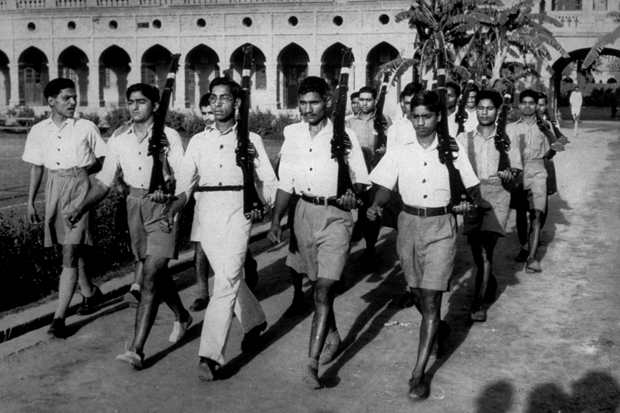It is often said that cricket was ‘a game invented by the English and played by Indians’, and every so often a book comes along that makes you think that something similar could be said of the English language. It would seem from Farthest Field’s dust jacket that this is Raghu Karnad’s first book, but if this assured and moving memoir of wartime India is an apprentice piece, then you can only wonder what is coming next.
From the very first page it is the brilliance of the writing that stands out. There is a very English control of irony that can suggest Forster — the Forster of A Passage to India — at his best, but there is nothing remotely Bloomsbury or comfortingly English about the imaginative power, intelligence and descriptive richness of a narrative that, again and again, startles by its originality before convincing by its utter fitness.
It is just as well that the writing is as good as it is, because Farthest Field inhabits that risky no man’s land between historical fact and imaginative reconstruction. There will inevitably be readers who dislike or distrust such an approach; but there are vast areas of history that can never be recovered through conventional sources, lives and truths that have slipped beyond the reach of regimental diaries, oral tradition or even family lore and can only be reclaimed through the imagination.
Such was the case with Karnad’s own Parsi family, and a history of which he knew almost nothing. As a boy growing up in Madras he was always vaguely aware of the three faces that stared out of their silver frames; but it was only when it was too late to ask anyone who could have told him their story that curiosity, family piety — indignation at an injustice done? — brought him to ask himself who those men were and why they had been so completely erased from family memory or the collective consciousness of post-independence India.
The answer was that one of them — the young face that resembled his own — was that of his mother’s father, the other two her uncles, and their fault was to fight and die for Britain and for a cause that a free India would reject. In Britain there has always been a lingering sense that the ‘Forgotten Army’ who fought the Burma campaign never got the credit or gratitude it deserved; but for the Indians who made up the vast bulk of that army, and found themselves fighting not just the Japanese but Subhas Chandra Bose’s Indian National Army, the only reward would be oblivion at home and the hollow rhetoric of an empire that had never trusted them and would soon abandon them to the horrors of Partition. Karnad writes:
When the war was over, the Indian army — and the more than two million men and women who served in it — found that they had spent the past six years on the wrong side of history. From then on, and ever since, having fought for free India would be the price of admission into national memory. Those who survived still had a chance to earn that coin, and many did, in the new wars that began almost at once. But those who died would be left to lie, in silent cemeteries where words carved in marble insisted to nobody: ‘Their Name Liveth Forever More’.
Karnad’s achievement in Farthest Field is to make triumphant redress of that injustice. In doing so, too, in bringing so vividly to life the loves, aspirations, confusions and bitter heartaches of an Indian family caught up in a war that their country could neither escape nor embrace, he has rescued a largely forgotten strand of history that is as much ours as it is India’s. For anyone who takes Britain’s past and reputation to heart, that history might well make for sobering reading — nothing became the Raj quite so ill as its leaving.
But this book is an affirmation of life, not a polemic against empire or colonial injustice. For all the damning clarity of its political analysis, it is wonderfully generous, full of intelligence, compassion, curiosity and brilliant writing. Just sometimes the structure falters under the weight of its own ambition, but it is only because most of it is so good that one even notices. And whether in the end it should be thought of as a work of strict historical fact or what Karnad calls ‘forensic non-fiction’ wouldn’t really seem to matter. Whichever it is, it has the stamp of imaginative truth about it and we can ask nothing more of any kind of writing.






Comments